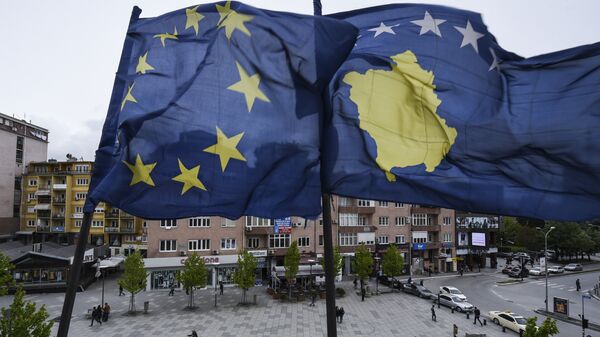The scandalous statement by the leader of the opposition Alliance for the Future of Kosovo, invited a quick rebuke from Germany, which said that any talk about redrawing borders is “dangerous.”
Haradinaj’s threat came hard on the heels of similar “Greater Albania” statements recently made by Albanian and pro-Albanian politicians.
"This project that I'm working on is meant for all Albanians in Kosovo, in diaspora, in Albania. I'm working on a joint project, on their unification.”
These words said last week by William Walker, former head of an OSCE mission in Kosovo, raised many eyebrows and invited angry backlash from Serbian President Aleksandar Vucic.
EU foreign affairs and security commissioner Federica Mogherini said last week that after the dust raised by Brexit has settled, the Balkan countries, which have long been knocking on the EU’s door, would have a chance to join in.
In an interview with Sputnik Serbia, Dragan Djukanovic from the Foreign Policy Center in Belgrade said that Kosovo’s joining the EU was the most realistic scenario that would cool passions and preserve the existing state borders.
He added that the EU could repeat the “Romanian-Bulgarian scenario” of 2007 when Brussels agreed to take in the two Balkan countries even though they didn’t fully meet the bloc’s accession criteria.
“The question is, however, whether EU membership is really what Kosovo now needs. Ramush Haradinaj recently said that he doesn’t believe that Brussels can resolve the problems existing between Kosovo and Serbia, that’s why he insists that Washington return to the Balkans.”
In an interview with Sputnik, Pyotr Iskenderov from the Institute of Slavic Studies in Moscow said that although the Kosovo leaders know that the Balkans do not top the list of Washington’s foreign policy priorities, they still hope that President Trump will help do away with what remains of Serbian self-rule in the country’s north.
“They think that once this has been done, the EU and the US should forget about Kosovo’s problems and concentrate exclusively on sending them money,” Iskenderov noted.
“The EU has seen its positions in the Balkans seriously eroded over the past couple of years, that’s why the Kosovo leaders are gradually shifting their attention towards Washington,” he added.
In April, Albanian Prime Minister Edi Rama went on record saying that Albania and the self-proclaimed republic of Kosovo, also inhabited by Albanians, could reach a "union."
Ethnic Albanians constitute the majority of the population in Albania and Kosovo, and represent significant minorities in neighboring countries such as Serbia, Macedonia and Montenegro.
The Greater Albania concept means unification of all Albanians into one state.
Never miss a story again — sign up to our Telegram channel and we'll keep you up to speed!





